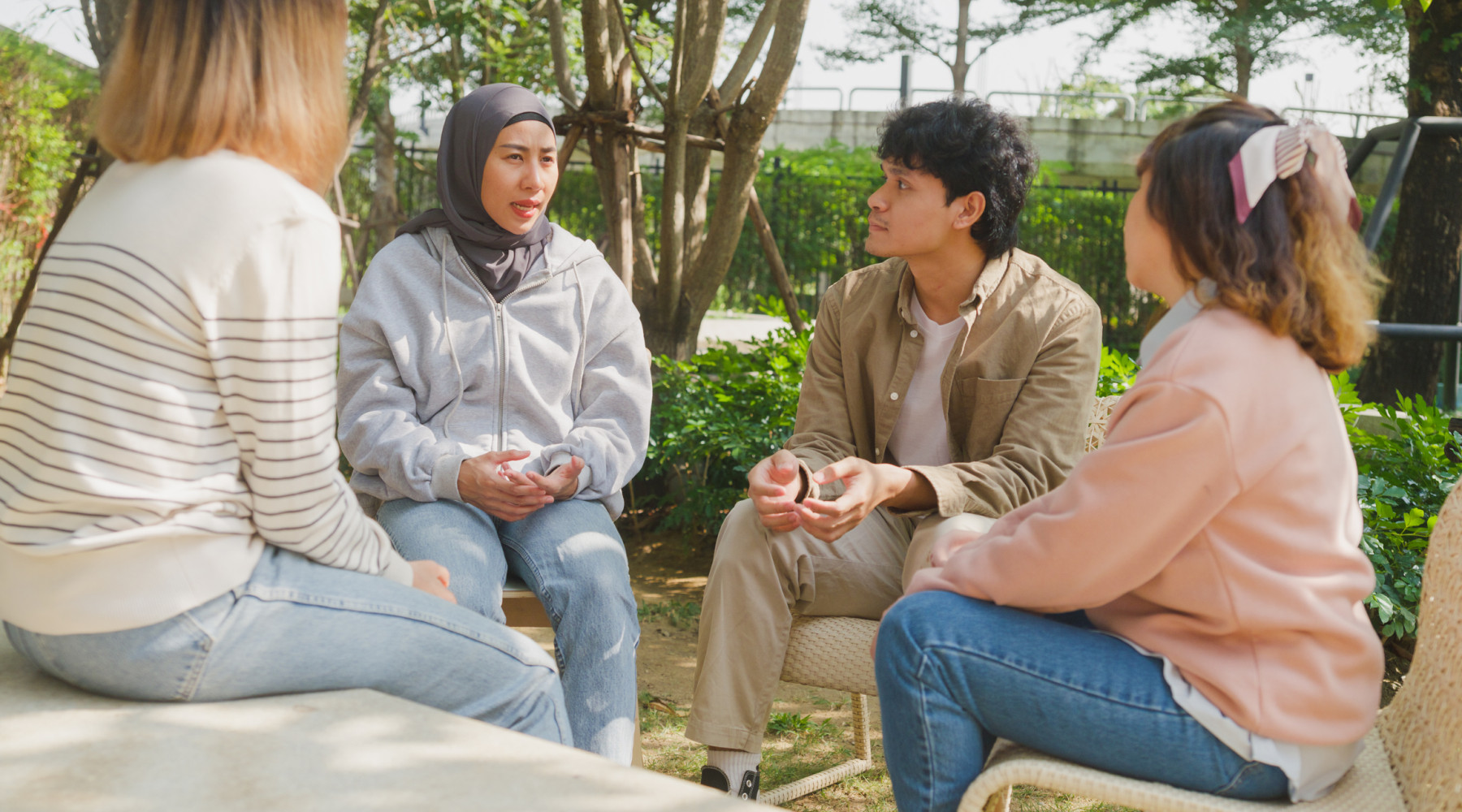How To Support Someone With Acquired Brain Injury
10 September, 2023
Acquired Brain Injuries (ABIs) are life-altering events that can affect individuals and their families in profound ways. These injuries can result from traumatic incidents, such as accidents or falls, or non-traumatic causes like strokes or infections. While the journey of recovery and adapting to changes after a brain injury can be challenging, the support and care provided by friends, family members, and the community can make a world of difference.
In this guide, we will explore how to support someone with a brain injury, how you can find additional support through the National Disability Insurance Scheme (NDIS) and how you can help maintain your own health and well-being as a care-giver. We hope that this guide can help you on this journey and assist you to provide the best possible support for your loved one.

Section 1: Understanding Acquired Brain Injuries
Before diving into how to provide support, it's essential to understand what a brain injury is, its causes, and the potential consequences
What Is an Acquired Brain Injury?
An acquired brain injury refers to any injury to the brain that occurs after birth.
To find out more about ABIs, please read our Guide to Acquired Brain Injuries.
ABIs can result from various factors, including:
Traumatic Brain Injury:
Traumatic brain injury causes can include car accidents, falls, sports-related injuries, physical assaults and other sources of head injury.
Non-Traumatic Head Injury:
Non-traumatic brain injury causes can include medical conditions such as strokes, brain tumours, infections, anoxia (lack of oxygen), and other diseases.
Learn more about the causes of ABI.
Consequences of ABIs
The effects of a brain injury can vary widely, depending on the location and severity of the injury. Common consequences of brain damage include:
Cognitive Impairments: Memory problems, difficulty with attention and concentration, and impaired problem-solving abilities.
Physical Impairments: Weakness, paralysis, the injured person may lose consciousness at times, or may have coordination difficulties.
Communication Difficulties: Challenges in speaking, understanding language, or expressing thoughts.
Emotional and Behavioural Changes: Mood swings, depression, anxiety, and impulsivity.
Learn more more about the symptoms of mild ABIs in our blog.

Section 2: How to Provide Emotional Support
Supporting someone with a brain injury begins with offering emotional support. It's crucial to be patient, empathetic, and understanding during their recovery journey. However, this can often be the most challenging part of the support journey for family members.
It is normal to feel sad or frustrated at times. However, you can only do your best, so try not to be too hard on yourself if you feel like you are coming up short at times.
There are several steps you can take to ensure you're providing the best emotional support possible to your loved one.
1. Listen Actively and Empathetically:
Encourage the person to express their feelings and thoughts. Be a compassionate and non-judgmental listener.
Avoid interrupting or offering immediate solutions. Sometimes, individuals simply need a safe space to talk and be heard.
2.Validate Their Feelings:
Acknowledge the person's emotions and let them know that their feelings are valid. For example, say, "It's okay to feel frustrated" or "I understand that this is challenging."
3. Be Patient:
Recovery from a brain injury can be a slow and unpredictable process for the injured person. Practice patience and understand that progress may be gradual.
Celebrate even small achievements and milestones to boost their self-esteem.
4. Encourage Expression Through Art or Journaling:
Some individuals find solace in creative activities like art, music, or journaling. Encourage and facilitate these outlets for emotional expression.
Some NDIS service providers offer therapies such as art therapy and music therapy that can be of great benefit.
5. Respect Their Independence:
Promote independence to the extent possible. Allow the injured person to make choices and decisions about their daily life and recovery process.
Offer support when needed, but avoid being overly controlling or intrusive. Respect their autonomy and choices, even if they differ from your own preferences.
6. Provide Routine and Structure:
Establish a daily routine or schedule that can provide a sense of stability and predictability. This can help reduce anxiety and provide a sense of control.
7. Offer Reassurance and Encouragement:
Offer words of reassurance and encouragement regularly. Express your belief in their ability to overcome challenges and make progress.
8. Facilitate Social Connections:
Encourage the person to maintain social connections with friends and family. Social support is crucial for emotional well-being.
Arrange visits or social activities with loved ones to reduce feelings of isolation.
9. Help Them Set Realistic Goals:
Work with the person to set achievable short-term and long-term goals. Celebrate their accomplishments along the way.
Break down larger goals into smaller, manageable steps to avoid feeling overwhelmed.
10. Seek Professional Support When Needed:
Encourage the person to access professional psychological support, such as counselling or therapy, to address specific emotional challenges.
If you notice signs of depression, anxiety, or other mental health concerns, consult a health professional.
11. Promote Self-Care:
Emphasize the importance of self-care for their emotional well-being. Encourage them to engage in activities that bring joy and relaxation.
Offer assistance with self-care activities when necessary.
12. Show Unconditional Love and Support:
Express your love and commitment to being there for them throughout their journey. Knowing they have a reliable source of support can be comforting. Even though they may have experienced some changes, your loved one is still the same person they were before the injury.

Section 3: Practical Support for Daily Living
In addition, individuals with traumatic brain injuries often require assistance with daily activities.
1. Physical Assistance
Help with tasks like bathing, dressing, mobility and other challenges of everyday life. Ensure the environment is safe to prevent accidents or falls.
2. Medication Management
Assist with medication schedules, prescriptions, and tracking side effects.
3. Communication Support
If the individual experiences communication difficulties, consider using communication aids or alternative communication methods.
4. Rehabilitation Exercises
Encourage and support participation in rehabilitation exercises recommended by healthcare professionals.

Section 4: Building a Support Network
Supporting someone with severe brain injury is a team effort. Consider the following steps to create a robust support network:
1. Involve Healthcare Professionals
Collaborate with doctors, therapists, and rehabilitation specialists to develop and monitor a personalised care plan.
2. Seek Guidance from Support Groups
Connect with local or online support groups for brain injury survivors and their families. Sharing experiences and advice can be invaluable.

Section 5: Navigating the NDIS for ABI Support
In Australia, the National Disability Insurance Scheme (NDIS) offers comprehensive support to individuals with disabilities. Depending on the nature of the injury, this can include those with a brain injury. Here's how to access NDIS support:
1. Eligibility
Determine if the person with a brain injury meets the NDIS eligibility criteria. The NDIS primarily considers the impact of the disability on daily life and independence.
2. Application
To apply for NDIS support:
Contact the NDIS directly or visit their website to initiate the application process.
Gather relevant documents, including medical reports, assessments, and information about the brain injury's impact on daily life.
3. Assessment
The NDIS will assess the individual's needs, goals, and aspirations. This assessment will inform the development of a personalised support plan.
4. Support Plan
Work with the NDIS to create a support plan tailored to the individual's needs. The plan may include funding for:
Therapy and rehabilitation services.
Assistive technology and equipment.
Home and vehicle modifications.
Support workers for daily activities.
Community participation programs.
Respite care for family members.

5. NDIS Service Providers
Your NDIS plan can either be self-managed, or managed with the assistance of an NDIS Service Provider. NDIS Service Providers help to deliver NDIS funded support services to people who have been approved for NDIS funding.
Support providers can be instrumental in helping individuals with a brain injury achieve their goals, enhance their independence, and improve their quality of life.
In order to find an NDIS service provider that's right for you, you should research different providers in your area and look for providers that align with your needs. In order to do this, you could check out their website, read their client testimonials and reviews, and learn about their team of support coordinators. This will give you a better understanding of their approach and expertise.
You can also search for support coordination service providers near you using the Provider Finder tool from the NDIS website.
It's also important for participants to realise that support coordinators can be either registered or unregistered.
All support coordinators – registered and non-registered – are required to follow the NDIS Code of Conduct, however the advantage of registered support coordinators is that they must also meet the quality standards set out in the NDIS Practice Standards .
Focus Care is a registered NDIS provider and we offer a wide range of services and supports, including support coordination services to help you get the most out of your NDIS Plan.

Section 6: Self-Care for Caregivers
Supporting someone with a brain injury can be emotionally and physically demanding. Remember to take care of yourself to provide the best support possible.
1. Seek Respite
Don't hesitate to ask for help or rest or respite care when needed to prevent caregiver burnout.
2. Maintain Your Health
Prioritise your physical and mental well-being through regular exercise, a balanced diet, and stress management techniques.
3. Educate Yourself
Learn about caregiver resources and support available in your community.
How Can Focus Care Help?
Supporting someone with a brain injury or other physical injuries, can be a challenging journey. With patience, empathy, and a strong support network, you can make a significant difference in their recovery and quality of life. The NDIS in Australia offers valuable assistance to enhance their independence and well-being. Remember that you are not alone, and there are resources and professionals available to guide you through this journey.
At Focus Care, we pride ourselves on providing leading home care services for everyone, including people with an acquired brain injury. Our acquired brain injury support services page will tell you our current offerings - you might even like to try creative support solutions like art therapy!
Embracing clients as individuals, our goal is to provide a personalised level of care and support. Talking together, we’ll work with you to find the care solutions you want - and the flexibility and freedom you need.
Want to find out more about the acquired brain injury support services we offer? Reach out to our friendly team or read through our list of services.




